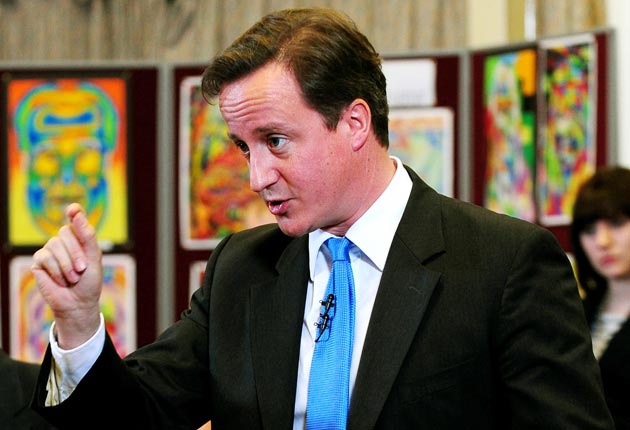Voters reject claims of fairness as majority say cuts hit poorest hardest
'Independent' poll reveals the political damage for the Coalition

Your support helps us to tell the story
From reproductive rights to climate change to Big Tech, The Independent is on the ground when the story is developing. Whether it's investigating the financials of Elon Musk's pro-Trump PAC or producing our latest documentary, 'The A Word', which shines a light on the American women fighting for reproductive rights, we know how important it is to parse out the facts from the messaging.
At such a critical moment in US history, we need reporters on the ground. Your donation allows us to keep sending journalists to speak to both sides of the story.
The Independent is trusted by Americans across the entire political spectrum. And unlike many other quality news outlets, we choose not to lock Americans out of our reporting and analysis with paywalls. We believe quality journalism should be available to everyone, paid for by those who can afford it.
Your support makes all the difference.Voters reject George Osborne's claims that his spending cuts are "fair" and will hit the better off more than the poor, according to an opinion poll for The Independent.
Six out of 10 people (59 per cent) believe the cuts the Chancellor announced in his government-wide spending review on Wednesday are unfair because they will hit the poorest people, while 36 per cent disagree.
One in three people (34 per cent) who voted Conservative in May and 59 per cent of those who backed the Liberal Democrats think the cuts are unfair, suggesting a marked difference of view between supporters of the two Coalition partners. Some 80 per cent of people who supported Labour think Mr Osborne's measures are not fair. People in the bottom DE social group (68 per cent) are more likely than those in the top AB group (50 per cent) to view measures as unfair.
Only 30 per cent of people accept the Chancellor's central claim that the better off will bear most of the burden of the cuts, while 64 per cent disagree. Surprisingly, people in social group DE are more likely to agree (37 per cent) than those higher up the income scale.
People who supported Mr Clegg's party in May are the least likely to agree that those with the broadest shoulders are bearing the heaviest burden of the cuts –22 per cent, compared to 23 per cent of Labour voters and 39 per cent of Tory voters.
One in three people (36 per cent) believe the Liberal Democrats should not stay in the Coalition because of the scale of the cuts, but 51 per cent think they should remain in it. Only one in four people (26 per cent) who voted Liberal Democrat in May agree that the party should now pull out of the Coalition, as do 27 per cent of those who backed the Tories.
Younger age groups, among whom there was a surge of support for Nick Clegg's party during the election campaign, are most likely to think they should leave the Coalition.
Although the findings on "fairness" are a setback for the Government, Labour cannot take too much comfort from the survey. Six out of 10 people (59 per cent), including one in three who voted Labour in May, believe that the last Labour government bears most responsibility for the deficit in the public finances. Just 36 per cent disagree.
A third of people who backed Labour (32 per cent) agree with this statement, as do 87 per cent of those who voted Tory and 56 per cent of those who backed the Liberal Democrats. The findings suggest that Labour may face a long struggle to regain people's trust on the economy.
Yesterday Labour attacked Mr Clegg after he called into question a study by the respected Institute for Fiscal Studies which found that the spending review is regressive rather than progressive. The Deputy Prime Minister said the Government "fundamentally" disagreed with the IFS verdict and described its measure of fairness as "a complete nonsense".
Mr Clegg insisted that people do not live only on the basis of the benefits they receive. "They also depend on public services, such as childcare and social care. All of those things have been airbrushed out of the picture by the IFS."
Claiming that "the richest are paying the most", he added: "Those who say otherwise are not being very straight with people and frankly they are frightening people."
Ed Miliband, the Labour leader, said: "Instead of trashing the Institute for Fiscal Studies, the Deputy Prime Minister should be owning up to the truth. This was a spending review driven by ideology, hitting lower and middle income families the hardest. We have consistently warned about the consequences of cutting too far and too fast.
"The unedifying spectacle of Mr Clegg rubbishing the IFS will convince nobody of the Government's case."
In a separate poll for BBC2's Daily Politics programme, ComRes found that the public is divided over the cuts. While 42 per cent regard them as about right, 39 per cent believe they went too far and 9 per cent that they did not go far enough.
Some 39 per cent said they support the cuts and a further 13 per cent that they strongly support them, meaning that a narrow majority is in favour. Some 24 per cent say they oppose the measures and 15 per cent that they strongly oppose them.
ComRes telephoned a random sample of 1003 GB adults on 21 October 2010 for 'The Independent'. Data were weighted to be demographically representative of all GB adults. ComRes is a member of the British Polling Council and abides by its rules. Full tables at www.comres.co.uk.
Join our commenting forum
Join thought-provoking conversations, follow other Independent readers and see their replies
Comments